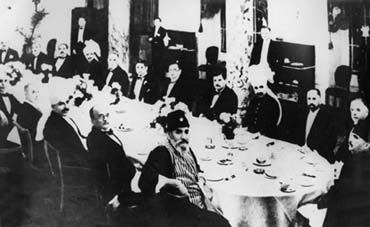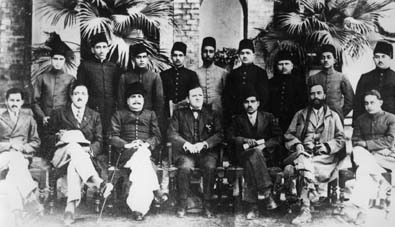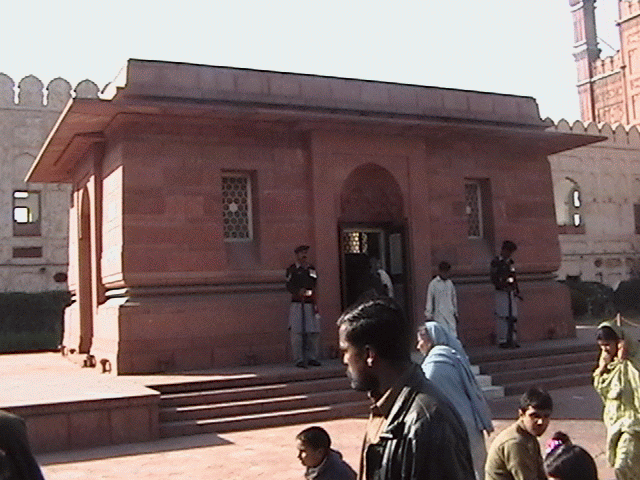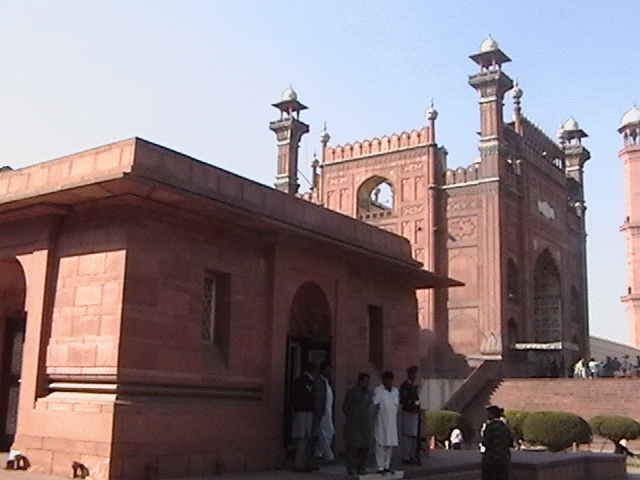
(The Poet Philosopher)
 He was born at Sialkot (present Pakistan) on Friday, November 9, 1877 of a pious family of small merchants and was educated at Scotch Mission College, Sialkot and later he did his graduation in Arabic and Philosophy from the famous Government College, Lahore and was awarded Jamaluddin Gold Medal for securing highest marks in Arabic, and another Gold Medal in English. Later he did is masters in philosophy from the Government College, Lahore, securing first rank in Punjab state and awarded Gold Medal. As Assistant Professor, Government College, Lahore he published his first book, "Ilm-ul-Iqtasad" (study of economics) in 1903. He then went to Europe from 1905 to 1908 to earn a degree in philosophy from the University of Cambridge, qualified as a barrister in London, and received a doctorate from the University of Munich. His thesis, The Development of Metaphysics in Persia, revealed some aspects of Islamic mysticism formerly unknown in Europe. From 1907 to 1908 he was Professor of Arabic at the University of London. In 1908 he returned to India as a Ph D and Bar at Law and started his practice as a barrister and a part-time professor of Philosophy and English Literature.
He was born at Sialkot (present Pakistan) on Friday, November 9, 1877 of a pious family of small merchants and was educated at Scotch Mission College, Sialkot and later he did his graduation in Arabic and Philosophy from the famous Government College, Lahore and was awarded Jamaluddin Gold Medal for securing highest marks in Arabic, and another Gold Medal in English. Later he did is masters in philosophy from the Government College, Lahore, securing first rank in Punjab state and awarded Gold Medal. As Assistant Professor, Government College, Lahore he published his first book, "Ilm-ul-Iqtasad" (study of economics) in 1903. He then went to Europe from 1905 to 1908 to earn a degree in philosophy from the University of Cambridge, qualified as a barrister in London, and received a doctorate from the University of Munich. His thesis, The Development of Metaphysics in Persia, revealed some aspects of Islamic mysticism formerly unknown in Europe. From 1907 to 1908 he was Professor of Arabic at the University of London. In 1908 he returned to India as a Ph D and Bar at Law and started his practice as a barrister and a part-time professor of Philosophy and English Literature. it upon himself to inspire the Muslims to consolidate themselves in order to imbibe the true spirit of Islam. This is not to deny the greatness of his poetry, which, at times, transcends national frontiers and embraces universal human values. However, Iqbal never considered himself as a poet, "I have never considered myself a poet. Therefore, I am not a rival of anyone, and I do not consider anybody my rival. I have no interest in poetic artistry. But, yes, I have a special goal in mind for whose expression I use the medium of poetry considering the condition and the customs of this country." Iqbal's contribution to the Muslim world as one of the greatest thinkers of Islam remains unparalleled. In his writings, he addressed and exhorted people, particularly the youth, to stand up and boldly face life's challenges. The central theme and main source of his message was the Qur'an. His poetry and philosophy, written in Urdu and Persian, stress the rebirth of Islamic and spiritual redemption through self-development, moral integrity, and individual freedom. His many works include "The Secrets of the Self"; a long poem; "A Message from the East" and "The Reconstruction of Religious Thought in Islam".
it upon himself to inspire the Muslims to consolidate themselves in order to imbibe the true spirit of Islam. This is not to deny the greatness of his poetry, which, at times, transcends national frontiers and embraces universal human values. However, Iqbal never considered himself as a poet, "I have never considered myself a poet. Therefore, I am not a rival of anyone, and I do not consider anybody my rival. I have no interest in poetic artistry. But, yes, I have a special goal in mind for whose expression I use the medium of poetry considering the condition and the customs of this country." Iqbal's contribution to the Muslim world as one of the greatest thinkers of Islam remains unparalleled. In his writings, he addressed and exhorted people, particularly the youth, to stand up and boldly face life's challenges. The central theme and main source of his message was the Qur'an. His poetry and philosophy, written in Urdu and Persian, stress the rebirth of Islamic and spiritual redemption through self-development, moral integrity, and individual freedom. His many works include "The Secrets of the Self"; a long poem; "A Message from the East" and "The Reconstruction of Religious Thought in Islam".



 "Shikwa" (Complaint) at Lahore, written in Persian since he addressed his appeal to the entire Muslim world. In this work Iqbal puts forth his theory of the self, a strong condemnation of the self-negating quietism (i.e., the belief that perfection and spiritual peace are attained by passive absorption in contemplation of God and divine things) of classical Islamic mysticism; his criticism shocked many and excited controversy. Iqbal and his admirers steadily maintained that creative self-affirmation is a fundamental Muslim virtue; his critics said he imposed themes from the German philosopher Friedrich Nietzsche on Islam. This was followed by the epoch-making "Jawab-e-Shikwa" (Reply to Complaint) in 1912. In 1915, his long Persian poem "Asrar-e-Khudi" (Secrets of Self) was published, followed by counterpart to "Asrar-e-Khudi", published "Rumuz-e-Bekhudi" (Mysteries of Selflessness) in Persian in 1918. In response to Goethe's West-Ostlicher Divan, Iqbal wrote "Pay am-e-Mashriq" (The Message of the East) in Persian. His famous "Bang-e-Dra" ("The Call of the Bell") was published in 1924. In 1927 Zabur-e 'Ajam ("Persian Psalms") appeared, in which Iqbal displayed an altogether extraordinary talent for the most delicate and delightful of all Persian styles, the ghazal," or love poem. Came 1931, when a collection of his six lectures in the form of "Reconstruction of Religious Thought in Islam," was published. In 1932, "Javed Namah" was printed in Persian, which is considered to be in reply to Dante's 'Divine Comedy'. His famous collection "Bal-e-Jibril" in Urdu was published in 1934 and "Zarab-e-Kalim" in 1936, followed by "Pas Che Bayad Kard" in Persian, and "Payam-e-Mashriq" in September 1936. In most of his work, Iqbal gave intense expression to the anguish of Muslim powerlessness.
"Shikwa" (Complaint) at Lahore, written in Persian since he addressed his appeal to the entire Muslim world. In this work Iqbal puts forth his theory of the self, a strong condemnation of the self-negating quietism (i.e., the belief that perfection and spiritual peace are attained by passive absorption in contemplation of God and divine things) of classical Islamic mysticism; his criticism shocked many and excited controversy. Iqbal and his admirers steadily maintained that creative self-affirmation is a fundamental Muslim virtue; his critics said he imposed themes from the German philosopher Friedrich Nietzsche on Islam. This was followed by the epoch-making "Jawab-e-Shikwa" (Reply to Complaint) in 1912. In 1915, his long Persian poem "Asrar-e-Khudi" (Secrets of Self) was published, followed by counterpart to "Asrar-e-Khudi", published "Rumuz-e-Bekhudi" (Mysteries of Selflessness) in Persian in 1918. In response to Goethe's West-Ostlicher Divan, Iqbal wrote "Pay am-e-Mashriq" (The Message of the East) in Persian. His famous "Bang-e-Dra" ("The Call of the Bell") was published in 1924. In 1927 Zabur-e 'Ajam ("Persian Psalms") appeared, in which Iqbal displayed an altogether extraordinary talent for the most delicate and delightful of all Persian styles, the ghazal," or love poem. Came 1931, when a collection of his six lectures in the form of "Reconstruction of Religious Thought in Islam," was published. In 1932, "Javed Namah" was printed in Persian, which is considered to be in reply to Dante's 'Divine Comedy'. His famous collection "Bal-e-Jibril" in Urdu was published in 1934 and "Zarab-e-Kalim" in 1936, followed by "Pas Che Bayad Kard" in Persian, and "Payam-e-Mashriq" in September 1936. In most of his work, Iqbal gave intense expression to the anguish of Muslim powerlessness.Iqbal's Concept of Self ("Khdi"): The central theme of Iqbal's poetry revolves around the elevation of the "self" and addresses the Muslims to improve their spiritual being rather than the bodily and worldly needs. This concept is based on the basic tenants of Islam wherein to know Allah is to know oneself.


The two verses quoted above very finely and plainly explain the dividends of elevation of "self". Those who chose to offer prayers with no consequent effects on their lives and dealings with others, says Iqbal, have in fact not prayed at all. One needs to elevate himself to a level that Allah Himself ask the person as to what he needs. If we look around we would find that the human being's material needs and wants are of more immediate and pressing concern to him which overshadow and overwhelm his spiritual needs. The concern for his material existence results in his forsaking his "self", synonymous with forsaking Allah. This leads the human being to mistakenly regard his material existence as his true self and become oblivious to his real self - his "self". Iqbal received a knighthood from the British Government in honour of the "Asrar-i-Khudi" (The Secrets of the Self) at Lahore on January 1, 1923.
Iqbal's poetry initially revolved around Indian nationalism. But his visit to Europe and sufferings of the Muslims made him to change his perspective and he started to criticize nationalism and opined that nationalism in Europe had led to destructive racism and imperialism, and in India it was not founded on an adequate degree of common purpose. Now his poetry and speeches were full of the concept of pan-Islamism, a speech at Aligarh in 1910, under the title "Islam as a Social and Political Ideal," clearly indicated to his new concepts and perspective. Iqbal called for the unity and reform, which could only be achieved by strengthening the individual through obedience to the law of Islam, self-control, and acceptance of the idea that everyone is potentially a vicegerent of Allah.
Iqbal contended that the Muslim community must encourage the ideals of brotherhood and justice. The mystery of selflessness was the hidden strength of Islam. Ultimately, the only satisfactory mode of active self-realization was the sacrifice of the self in the service of causes greater than the self. The paradigm was the life of the Prophet Muhammad and the devoted service of the first believers. What an irony, that the lamentations of Iqbal still stand true today as the Muslim community remains as undivided and oblivious to the sufferings of the brother Muslims as it was in years of Iqbal.
Iqbal as a Politician and Supporter of Muslim Resurgence: The sufferings of the Muslims, specially in the Balkans, after the World War I, the end of the Ottoman Empire and slipping of ground under the Muslims' feet,  specially the sufferings of the Muslims of the Indian sub-continent and the unjust attitude towards them from the British and Hindus compelled Iqbal to enter the politics and was elected to the Punjab provincial legislature in 1927. He became the president of the all India Muslim League in 1930 and right away started its reconstruction and orientation towards the plight of the Muslims. Initially a supporter of Hindu-Muslim unity in a single Indian state, Iqbal later became an advocate of Pakistani independence. In addition to his political activism, Iqbal was considered the foremost Muslim thinker of his day. In 1930, Iqbal was invited to preside over the open session of the Muslim League at Allahabad. In his historic Allahabad Address, Iqbal visualized an independent and sovereign state for the Muslims of North-Western India. He said, "I would like to see the Punjab, North-West Frontier Province, Sind and Balochistan amalgamated into a single State. Self-government within the British Empire, or without the British Empire, the formation of a consolidated North-West Indian Muslim State appears to me to be the final destiny of the Muslims, at least of North-West India."
specially the sufferings of the Muslims of the Indian sub-continent and the unjust attitude towards them from the British and Hindus compelled Iqbal to enter the politics and was elected to the Punjab provincial legislature in 1927. He became the president of the all India Muslim League in 1930 and right away started its reconstruction and orientation towards the plight of the Muslims. Initially a supporter of Hindu-Muslim unity in a single Indian state, Iqbal later became an advocate of Pakistani independence. In addition to his political activism, Iqbal was considered the foremost Muslim thinker of his day. In 1930, Iqbal was invited to preside over the open session of the Muslim League at Allahabad. In his historic Allahabad Address, Iqbal visualized an independent and sovereign state for the Muslims of North-Western India. He said, "I would like to see the Punjab, North-West Frontier Province, Sind and Balochistan amalgamated into a single State. Self-government within the British Empire, or without the British Empire, the formation of a consolidated North-West Indian Muslim State appears to me to be the final destiny of the Muslims, at least of North-West India."
 In 1932, Iqbal headed a Muslim delegate to England to attend the Third Round Table Conference. While in London, Iqbal was invited by the London National League where he addressed prominent scholars and politicians, foreign diplomats, members of the House of Commons, Members of the House of Lords and Muslim members of the R.T.C. delegation. He very forcefully put across the Muslim view point and their plight back home. He explained why he wanted the communal settlement first and then the constitutional reforms. He stressed the need for provincial autonomy because autonomy gave the Muslim majority provinces some power to safeguard their rights, cultural traditions and religion. Under the central Government the Muslims were bound to lose their cultural and religious entity at the hands of the overwhelming Hindu majority. He referred to what he had said at Allahabad in 1930 and reiterated his belief that before long people were bound to come round to his viewpoint based on cogent reason.
In 1932, Iqbal headed a Muslim delegate to England to attend the Third Round Table Conference. While in London, Iqbal was invited by the London National League where he addressed prominent scholars and politicians, foreign diplomats, members of the House of Commons, Members of the House of Lords and Muslim members of the R.T.C. delegation. He very forcefully put across the Muslim view point and their plight back home. He explained why he wanted the communal settlement first and then the constitutional reforms. He stressed the need for provincial autonomy because autonomy gave the Muslim majority provinces some power to safeguard their rights, cultural traditions and religion. Under the central Government the Muslims were bound to lose their cultural and religious entity at the hands of the overwhelming Hindu majority. He referred to what he had said at Allahabad in 1930 and reiterated his belief that before long people were bound to come round to his viewpoint based on cogent reason.
During these days,  Jinnah was residing in London. Sensing the leadership qualities of Jinnah, Iqbal thought of none other than Jinnah to come forth and lead the Muslims' struggle. In fact, Iqbal preferred Jinnah to other more experienced Muslim leaders such as Sir Aga Khan, Maulana Shaukat Ali, Nawab Hamid Ullah Khan of Bhopal, Sir Ali Imam, Abul Kalam, and others. Iqbal wrote to Jinnah conveying to him his personal views on political problems and state of affairs of the Indian Muslims, and also persuading him to come back. He wrote, "I know you are a busy man but I do hope you would not mind my writing to you often, as you are the only Muslim in India today to whom the community has right to look up for safe guidance through the storm which is coming to North-West India, and perhaps to the whole of India." Iqbal was of the view, "There is only one way out. Muslim should strengthen Jinnah's hands. They should join the Muslim League. Indian question, as is now being solved, can be countered by our united front against both the Hindus and the English. Without it our demands are not going to be accepted. People say our demands smack of communalism. This is sheer propaganda. These demands relate to the defence of our national existence. ... The united front can be formed under the leadership of the Muslim League. And the Muslim League can succeed only on account of Jinnah. Now none but Jinnah is capable of leading the Muslims."
Jinnah was residing in London. Sensing the leadership qualities of Jinnah, Iqbal thought of none other than Jinnah to come forth and lead the Muslims' struggle. In fact, Iqbal preferred Jinnah to other more experienced Muslim leaders such as Sir Aga Khan, Maulana Shaukat Ali, Nawab Hamid Ullah Khan of Bhopal, Sir Ali Imam, Abul Kalam, and others. Iqbal wrote to Jinnah conveying to him his personal views on political problems and state of affairs of the Indian Muslims, and also persuading him to come back. He wrote, "I know you are a busy man but I do hope you would not mind my writing to you often, as you are the only Muslim in India today to whom the community has right to look up for safe guidance through the storm which is coming to North-West India, and perhaps to the whole of India." Iqbal was of the view, "There is only one way out. Muslim should strengthen Jinnah's hands. They should join the Muslim League. Indian question, as is now being solved, can be countered by our united front against both the Hindus and the English. Without it our demands are not going to be accepted. People say our demands smack of communalism. This is sheer propaganda. These demands relate to the defence of our national existence. ... The united front can be formed under the leadership of the Muslim League. And the Muslim League can succeed only on account of Jinnah. Now none but Jinnah is capable of leading the Muslims."
The following events were to prove how right Iqbal was in his vision to have selected Jinnah to lead the Muslims as Jinnah articulated the case of a separate homeland for Pakistan so brilliantly, that even the Hindus and the British could not stand in his way and had to succumb to his demands and gave way for the creation of Pakistan. A land thought of by none other than Iqbal, whom his life never allowed him to breathe the fragrance of independence. Just nine years before the independence, Iqbal breathed his last on April 21, 1938. In order to commend his services for the Muslims, he was buried in Lahore next to the Badshahi Mosque, so that all those coming for prayers could also pray for this great soul.



No comments:
Post a Comment